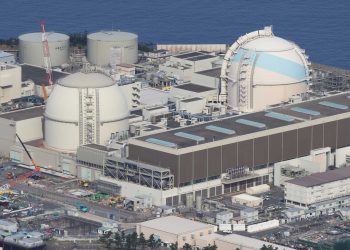,
WASHINGTON (Reuters): The United States has been exaggerating China's nuclear clout in a process that could lock the two into a Cold War-style arms race, two arms-control advocacy groups said in a report on Thursday.
The Defense Department and U.S. intelligence agencies have portrayed Chinese weapons developments as more threatening than warranted, to justify building a new generation of weapons, according to the study by the Federation of American Scientists and the Natural Resources Defense Council.
“The report's main finding is that the Pentagon and others routinely highlight specific incidents out of context that inaccurately portray a looming Chinese threat,” the groups said in a statement.
Specifically, they said, the Defense Department and U.S. intelligence agencies had been “embellishing China's submarine and long-range missile capabilities.”
China, in turn, views U.S. arms upgrades as a reason for modernizing its arsenal, said the 250-page report, which is based on an analysis of declassified and unclassified U.S. government documents as well as commercial satellite images of Chinese installations.
That could pitch the two into “a dangerous action-and-reaction competition reminiscent of the Cold War,” the two groups said.
“Military planners always need a rationale — a real or potential danger — for why they must have new weapons or new strategies and plans,” said the study, “Chinese Nuclear Forces and U.S. Nuclear War Planning.”
“With the dissolution of the Soviet Union, which occupied that role for almost 50 years, the United States has turned its attention to China to help fill the vacuum,” it said.
The report faulted China for cloaking its nuclear forces in secrecy amid what it portrayed as a U.S. government scare campaign bolstered by conservative media and think tanks.
The Pentagon and the office of the Director of National Intelligence had no immediate comment.
'REALISTIC PICTURE'
Larry Wortzel, outgoing chairman of a congressionally created bipartisan panel that studies U.S.-China security issues, said he thought the Pentagon had painted a “realistic picture of what China is doing in the nuclear arena.”
Beijing has been developing new generations of mobile ballistic missiles, experimenting with maneuverable warheads and multiple independently targeted re-entry vehicles as well as “developing countermeasures that make its nuclear force a more serious threat,” he said in reply to a query from Reuters.
The U.S. arsenal of about 10,000 nuclear weapons dwarfed China's roughly 200 and would continue to do so, the report said.
In a long-range planning study put out in February, the Pentagon voiced alarm at China's investments in “sophisticated land and sea-based (nuclear strike) systems” and said Beijing's buildup put a premium on developing U.S. forces “capable of sustained operations at great distances into denied areas.”
China has about 20 ballistic missiles capable of reaching the continental United States; the United States has more than 830 missiles — most with multiple warheads — that can hit China, it added.
“China is no Soviet Union,” said Robert Norris, a Natural Resources Defense Council analyst and a report co-author. He said the Pentagon had been using China to justify buying new missiles, destroyers, submarines and fighter planes.
Hans Kristensen, project director at the Federation of American Scientists and the report's lead author, told Reuters, “The hype has occurred, as far as we can see, in the assessments of the size of the Chinese nuclear arsenal, predicting and reporting when new systems will be deployed, and in 'cherry-picking' dramatic new developments taken out of context that overstate a threat.”









